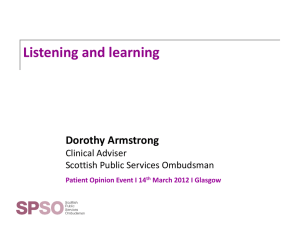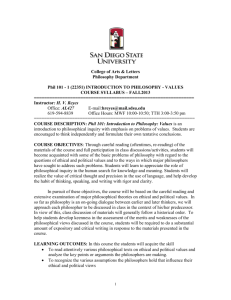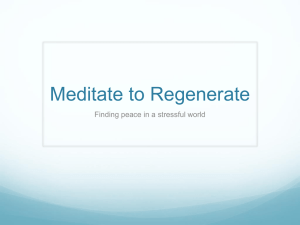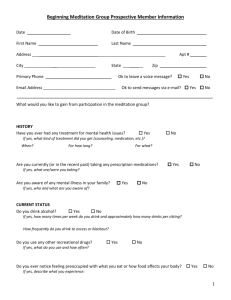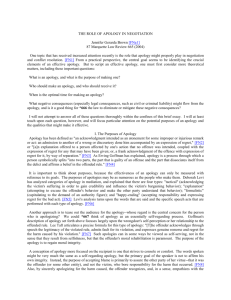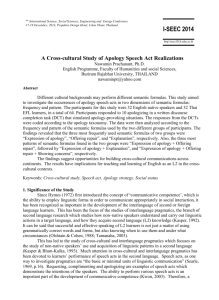Philosophy of Human Nature syllabus
advertisement
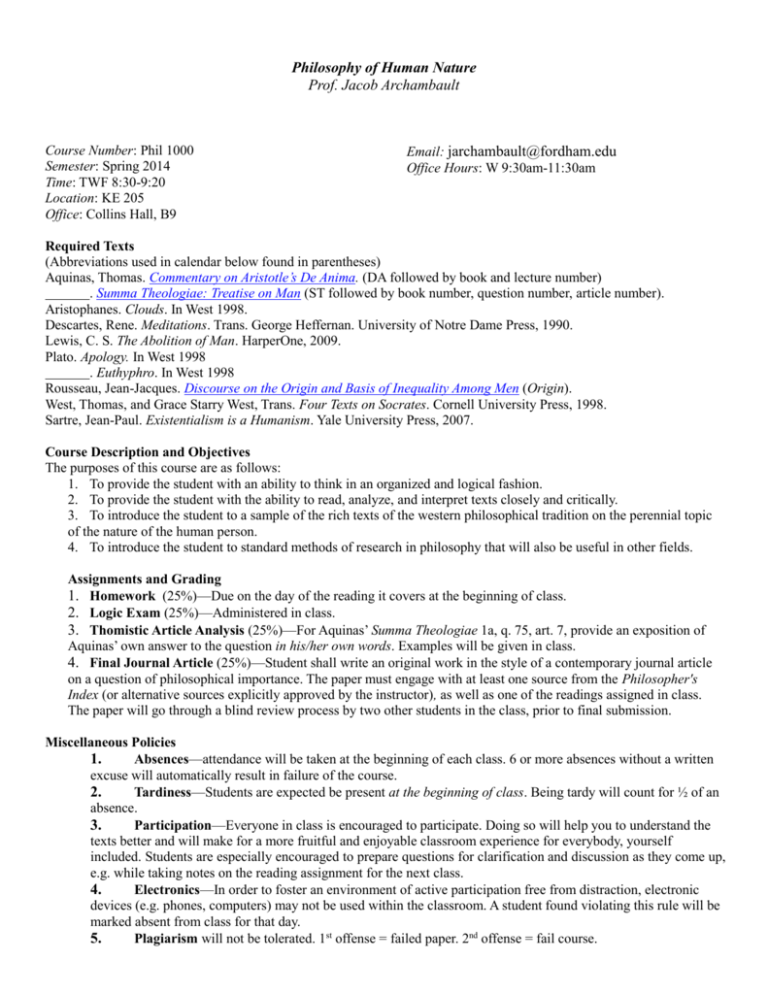
Philosophy of Human Nature Prof. Jacob Archambault Course Number: Phil 1000 Semester: Spring 2014 Time: TWF 8:30-9:20 Location: KE 205 Office: Collins Hall, B9 Email: jarchambault@fordham.edu Office Hours: W 9:30am-11:30am Required Texts (Abbreviations used in calendar below found in parentheses) Aquinas, Thomas. Commentary on Aristotle’s De Anima. (DA followed by book and lecture number) . Summa Theologiae: Treatise on Man (ST followed by book number, question number, article number). Aristophanes. Clouds. In West 1998. Descartes, Rene. Meditations. Trans. George Heffernan. University of Notre Dame Press, 1990. Lewis, C. S. The Abolition of Man. HarperOne, 2009. Plato. Apology. In West 1998 . Euthyphro. In West 1998 Rousseau, Jean-Jacques. Discourse on the Origin and Basis of Inequality Among Men (Origin). West, Thomas, and Grace Starry West, Trans. Four Texts on Socrates. Cornell University Press, 1998. Sartre, Jean-Paul. Existentialism is a Humanism. Yale University Press, 2007. Course Description and Objectives The purposes of this course are as follows: 1. To provide the student with an ability to think in an organized and logical fashion. 2. To provide the student with the ability to read, analyze, and interpret texts closely and critically. 3. To introduce the student to a sample of the rich texts of the western philosophical tradition on the perennial topic of the nature of the human person. 4. To introduce the student to standard methods of research in philosophy that will also be useful in other fields. Assignments and Grading 1. Homework (25%)—Due on the day of the reading it covers at the beginning of class. 2. Logic Exam (25%)—Administered in class. 3. Thomistic Article Analysis (25%)—For Aquinas’ Summa Theologiae 1a, q. 75, art. 7, provide an exposition of Aquinas’ own answer to the question in his/her own words. Examples will be given in class. 4. Final Journal Article (25%)—Student shall write an original work in the style of a contemporary journal article on a question of philosophical importance. The paper must engage with at least one source from the Philosopher's Index (or alternative sources explicitly approved by the instructor), as well as one of the readings assigned in class. The paper will go through a blind review process by two other students in the class, prior to final submission. Miscellaneous Policies 1. Absences—attendance will be taken at the beginning of each class. 6 or more absences without a written excuse will automatically result in failure of the course. 2. Tardiness—Students are expected be present at the beginning of class. Being tardy will count for ½ of an absence. 3. Participation—Everyone in class is encouraged to participate. Doing so will help you to understand the texts better and will make for a more fruitful and enjoyable classroom experience for everybody, yourself included. Students are especially encouraged to prepare questions for clarification and discussion as they come up, e.g. while taking notes on the reading assignment for the next class. 4. Electronics—In order to foster an environment of active participation free from distraction, electronic devices (e.g. phones, computers) may not be used within the classroom. A student found violating this rule will be marked absent from class for that day. 5. Plagiarism will not be tolerated. 1st offense = failed paper. 2nd offense = fail course. 6. Late assignments—Papers will be downgraded by 1/3 of a letter for each day late. Assignments will not be accepted more than a week late. Notice from the Office of Disability Services. Under the Americans with Disabilities Act and Section 504 of the Vocational Rehabilitation Act of 1973, all students, with or without disabilities, are entitled to equal access to the programs and activities of Fordham University. If you believe that you have a disabling condition that may interfere with your ability to participate in the activities, coursework, or assessment of the object of this course, you may be entitled to accommodations. Please schedule an appointment to speak with someone at the Office of Disability Services (Rose Hill - O’Hare Hall, Lower Level, x0655 or at Lincoln Center – Room 207, x6282). Week of: Jan 12-18 Tues Semester Overview Jan 19-25 Logic: Sq. of opposition Euthyphro 11b-16a Logic: 1st figure pt. 1 Apology 24b-28a Logic: 2nd figure pt. 2 Apology 38c-42a Logic: Meta-results Clouds 1-626 No Class DA II. 2 ST Ia, 75, 1, res ST Ia, 75, 4, res No Class Meditation I Q. 75, art. 7 analysis due Meditation IV Rousseau, Origin I – up to “The more we reflect…” Rousseau, Origin II – to end Sartre, Existentialism, 3954 Lewis, Abolition, ch. 3 Jan 26-Feb 1 Feb 2-8 Feb 9-15 Feb 16-22 Feb 23-Mar 1 Mar 2-8 Mar 9-15 Mar 16-22 Mar 23-29 Mar 30-Apr 5 Apr 6-12 Apr 13-19 Apr 20-26 Apr 27-May 3 Syllabus Wed Logic: Preliminaries Euthyphro 2a-6e Logic: syllogistic preliminaries Apology 17a-18e Logic: 1st figure pt. 2 Apology 28a-35d Logic: 3rd figure pt. 1 Crito 43a-46b Logic: propositional logic Clouds 627-1130 Logic Exam DA II. 3 ST Ia, 75, 2, res ST Ia, 75, 5, res No Class Meditation II, 1-9 Meditation VI, 1-15 Rousseau, Origin I – to end. Sartre, Existentialism, 17-39 Lewis, Abolition, ch. 1 Semester Wrap-up 1st Draft Returned Fri Logic: Categories Euthyphro 7a-11a Logic: conversion Apology 18e-24b Logic: 2nd figure pt. 1 Apology 35e-38b Logic: 3rd figure pt. 2 Crito 46b-54e Logic: Review Clouds 1131-1511 DA II. 1 DA II. 4 ST Ia, 75, 3 res ST Ia, 75, 6, res. No Class Meditation II, 10-16 Meditation VI, 16-25 Rousseau, Origin II – up to “But bodies politic…” No Class Lewis, Abolition, ch. 2 1st draft of final paper due


